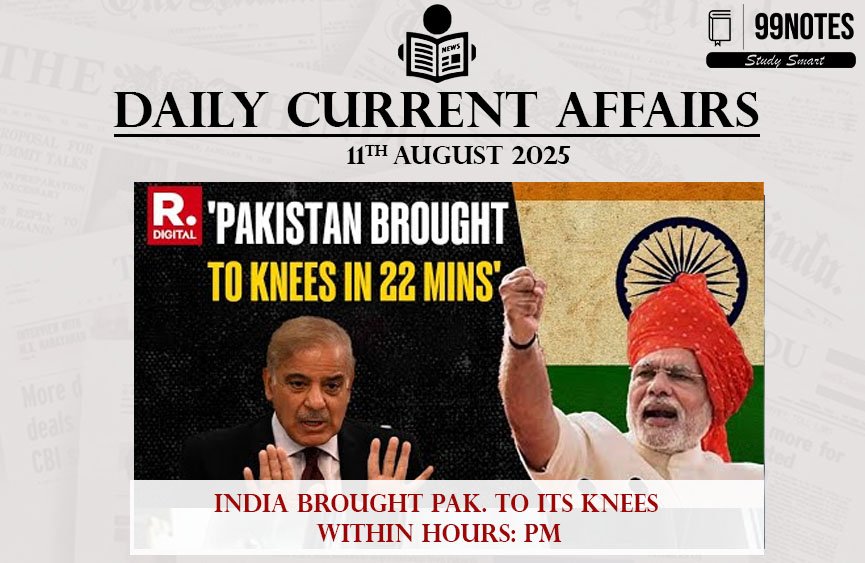11 August 2025 : Daily Current Affairs
1. India brought Pak. to its knees within hours: PM
Source: Page 1 , The Hindu UPSC IAS Edition
| Topic: GS- 2 – International Relations, GS Paper 3 – Security and Defense |
| Context |
|
Content
-
Operation Sindoor Highlights:
-
Swift and decisive response to cross-border terrorism, with the Indian Air Force downing six Pakistani aircrafts.
-
Indian Army advanced several kilometers into Pakistani territory after the April 22 Pahalgam terror attack, marking one of the most significant military pushes in recent times.
-
Demonstration of India’s military preparedness, technology, and the success of the “Make in India” initiative in defense.
-
-
Strategic and Diplomatic Implications:
-
Major boost in morale for the armed forces and public confidence in indigenous military manufacturing.
-
Heightened tensions with Pakistan but also an assertion of India’s red lines regarding state-sponsored terrorism.
-
The narrative management and rapid execution avoided a prolonged conflict, balancing retaliation with broader regional stability.
-
-
Way Forward:
-
Continued focus on indigenous R&D in defense, cybersecurity, and modern warfare.
-
Strategic communication and narrative management in international platforms to justify India’s security measures.
-
Practice Question:
|
“Operation Sindoor demonstrated a decisive shift in India’s counter-terrorism policy. Critically examine the role of indigenous technology in enhancing national security and discuss the diplomatic challenges India faces post such operations.“ (250 words / 15 marks) |
2. Political blame game escalates after Delhi floods
Source: page 2, The Hindu UPSC IAS Edition
| Topic: GS- 2 – Governance, GS Paper 3 – Disaster Management |
| Context |
|
Analysis from UPSC Angle:
-
Issues Identified:
-
Inadequate drainage infrastructure, largely of British colonial origin, unable to cope with modern city needs.
-
Despite rainfall being below average for the period, low-lying areas witnessed severe water-logging, resulting in deaths due to wall collapse.
-
Government interventions mitigated flooding at some critical points, but opposition criticized delayed and insufficient action.
-
-
Urban Planning and Disaster Management Challenges:
-
Gaps in coordination between municipal and state agencies.
-
Need for robust, climate-resilient urban infrastructure and proactive disaster preparedness.
-
Socio-economic impact of urban floods, especially on marginalized groups.
-
-
Way Forward:
-
Large-scale investment and upgradation of drainage and flood management systems.
-
Strengthen inter-agency coordination and early warning mechanisms.
-
Community engagement for disaster risk reduction.
-
Practice Question:
|
“Discuss the main challenges of urban flood management in Indian cities. How can inter-departmental coordination and infrastructure upgrades help address such issues?” (250 words / 15 marks) |
3. Delhi Education Policy Overhaul – New Subjects in Govt. Schools
Source: Page 2, Indian Express Delhi Edition
| Topic: GS-2 – Education, GS Paper 4 – Ethics & Human Interface |
| Context |
|
Key Points for UPSC:
-
Curricular Changes:
-
Emphasis on self-awareness, ethical values, emotional well-being, and social responsibility.
-
Introduction of structured frameworks across all grades (KG to Class 12) in Delhi government schools.
-
Teacher training and roll-out strategies are underway, with attention to philosophy and values.
-
-
Analysis:
-
Transition reflects push and pull between competing pedagogic philosophies (value-based education vs. employability skills).
-
Risks of curriculum change without adequate teacher buy-in, resource allocation, and monitoring outcomes.
-
-
Way Forward:
-
Evaluate curriculum outcomes through independent assessments.
-
Involve students, parents, and educators in curriculum feedback.
-
Align educational content with broader goals of holistic human development and constitutional values.
-
Practice Question:
|
“New curricular initiatives in Delhi schools aim to blend emotional intelligence and civic responsibility with academic learning. Critically assess the challenges and opportunities posed by frequent changes in school curricula.” (150 words / 10 marks) |
Check more: 8 August 2025 : Daily Current Affairs



